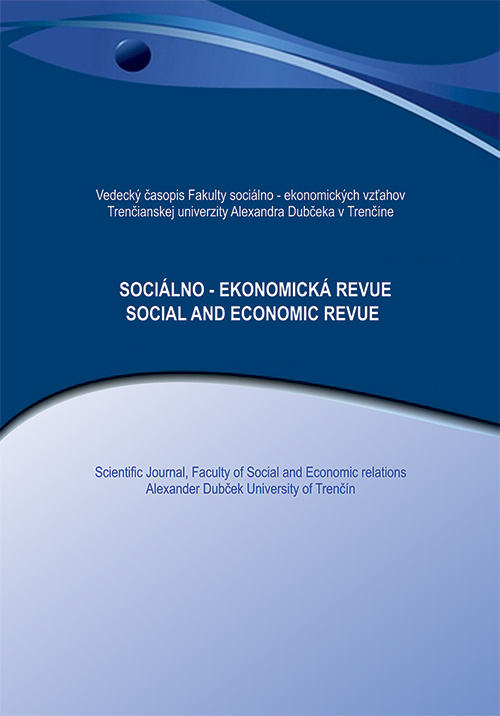EFFECTIVENESS OF JUST-IN-TIME PRINCIPLE IN TODAY´S CIRCULAR ECONOMY AND ITS NEGATIVE EFFECT
In the context of circular economy, manufacturers aim to improve the quality of the environment and human life. With regard to the nature of their production, business entities within circular economy adopt the philosophy of the Just-In-Time method. This paper analyses the impact of this method on the current supplier-customer relations in the Czech Republic as well as the quality of fulfilment of its obligations. Moreover, it is evaluated whether the concept of Just-In-Time method is suitable for efficient functioning of this economy. Based on the data obtained, a comparison analysis of the research problem is performed. The level of meeting deadlines for supplies in the manufacturing process of a domestic business entity is examined. The analysis performed did not confirm the idea of combining speed with the adaptive response to change. In the Czech Republic, the Just-In-Time method is currently influenced by a number of negative factors, which significantly affect the current supplier-customer relations and the quality of fulfilment of their obligations. The key factors affecting the effectiveness of the Just-In-Time principle include the extension of the stock replenishment period and inaccurate logistics cooperation in the area of production planning.
Release: 2022/1 Pages: 35-42 JEL classification: L620, L210
DOI: https://doi.org/10.52665/ser20220104
Keywords: Circular economy, Just-In-Time, stock, effectiveness of manufacturing process, production, automotive, production theory, minimization of costs
Section:
Contacts:
Eva Kalinová
School of Expertness and Valuation, Institute of Technology and Business in České Budějovice
Okružní 517/10, 370 01 České Budějovice, Czech Republic, e-mail: kalinova@mail.vstecb.cz
Denisa Kostečková
Student, School of Expertness and Valuation, Institute of Technology and Business in České Budějovice
Okružní 517/10, 370 01 České Budějovice, Czech Republic, e-mail: 30026@mail.vstecb.cz
Literature:
Aghazadeh, S. M. (2008). Investigating causal relations between labour productivity and JIT in SMEs. International Journal of Globalisation and Small Business, 2 (4).
Ahmad, S., Schroeder, R. G., Sinha, K. K. (2003). The role of infrastructure practices in the effectiveness of JIT practices: implications for plant competitiveness. Journal of Engineering and Technology Management, 20 (3), 161-191.
Belekoukias, I., Garza-Reyes, J. A., Kumar, V. (2014). The impact of lean methods and tools on the operational performance of manufacturing organisations. International Journal of Production Research, 52 (18), 5346-5366.
Crocker, R. (2018). Chapter 1 from ‘Spaceship Earth’ to the circular economy: The problem of consumption. Unmaking waste in production and consumption: Towards the circular economy. Emerald Publishing Limited, 13-33.
Geissdoerfer, M., Pieroni, M. P. P., Pigosso, D. C. A., Soufani, K. (2020). Circular business models: A review. Journal of Cleaner Production.
Chakrabarty, R., Roy, T., Chaudhuri, K. S. (2018). A two-warehouse inventory model for deteriorating items with capacity constraints and back-ordering under financial considerations. International Journal of Applied and Computational Mathematics, 4 (2).
Kurdve, M., Bellgran, M. (2021). Green lean operationalisation of the circular economy concept on production shop floor level. Journal of Cleaner Production.
Memari, A., Ahmad, R., Rahim, A. R. A., Hassan, A. (2018). Optimizing a Just-In-Time logistics network problem under fuzzy supply and demand: two parameter-tuned metaheuristics algorithms. Neural Computing and Applications, 30 (10), 3221-3233.
Mendez-Alva, F., Cervo, H., Krese, G., Van Eetvelde, G. (2021). Industrial symbiosis profiles in energy-intensive industries: Sectoral insights from open databases. Journal of Cleaner Production.
Parajuly, K., Wenzel, H. (2017). Potential for circular economy in household WEEE management. Journal of Cleaner Production, 272-285.
Suleiman, M. A., Huo, B., Ye, Y. (2021). Linking supplier JIT to flexibility performance: the moderating impact of advanced manufacturing technology and human resource empowerment. Industrial Management & Data Systems, 121 (11), 2237-2253.
Tortorella, G. L., Fettermann, D. C., Piñeres, A, Gaiardelli, P. (2018). The moderating role of just‐in‐time on sociotechnical practices' effect over quality and workers' health. Human Factors and Ergonomics in Manufacturing & Service Industries, 29 (3), 210-223.
Wiebe, K. S., Harsdorff, M., Montt, G., Simas, M. S., Wood, R. (2019). Global circular economy scenario in a multiregional input–output Framework. Environmental Science & Technology, 53 (11), 6362-6373.
Zhou, B, He, Z. (2021). A static semi-kitting strategy system of JIT material distribution scheduling for mixed-flow assembly lines. Expert Systems with Applications.


